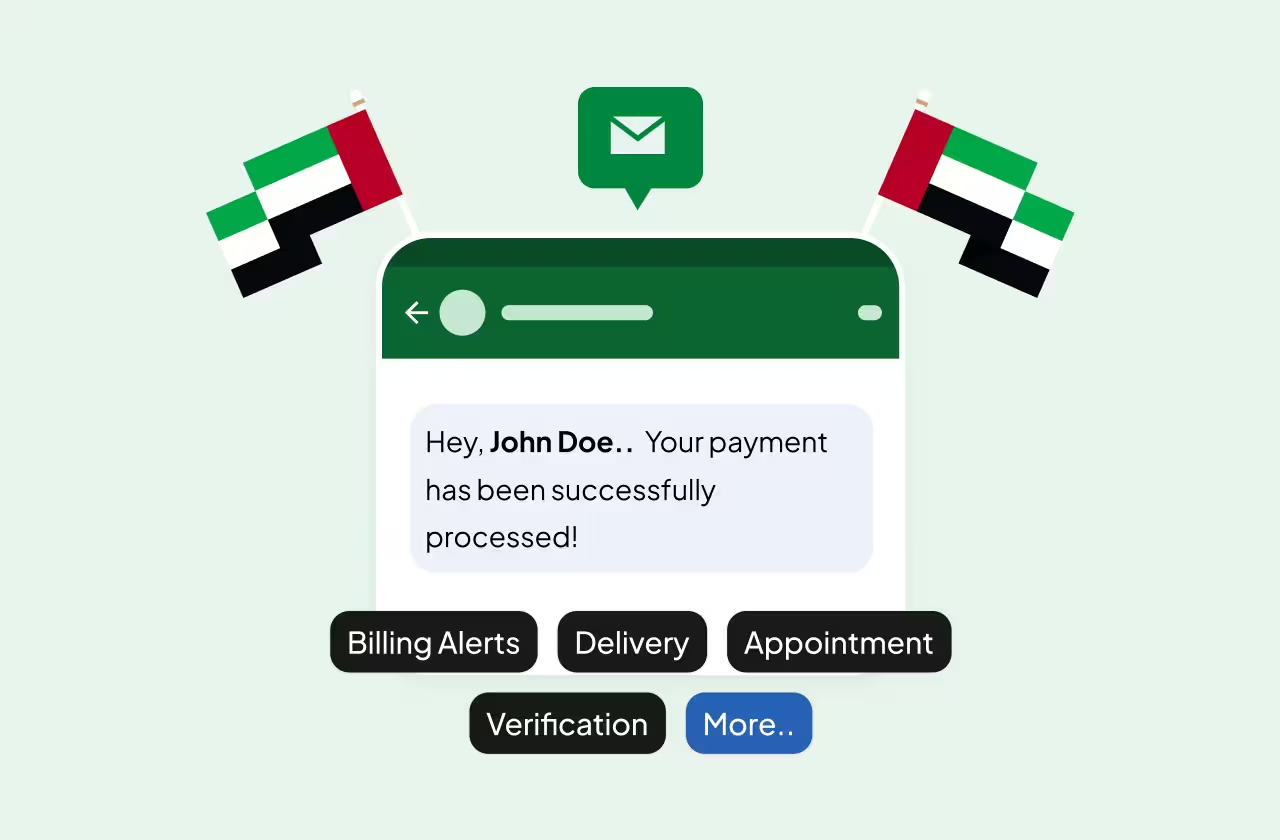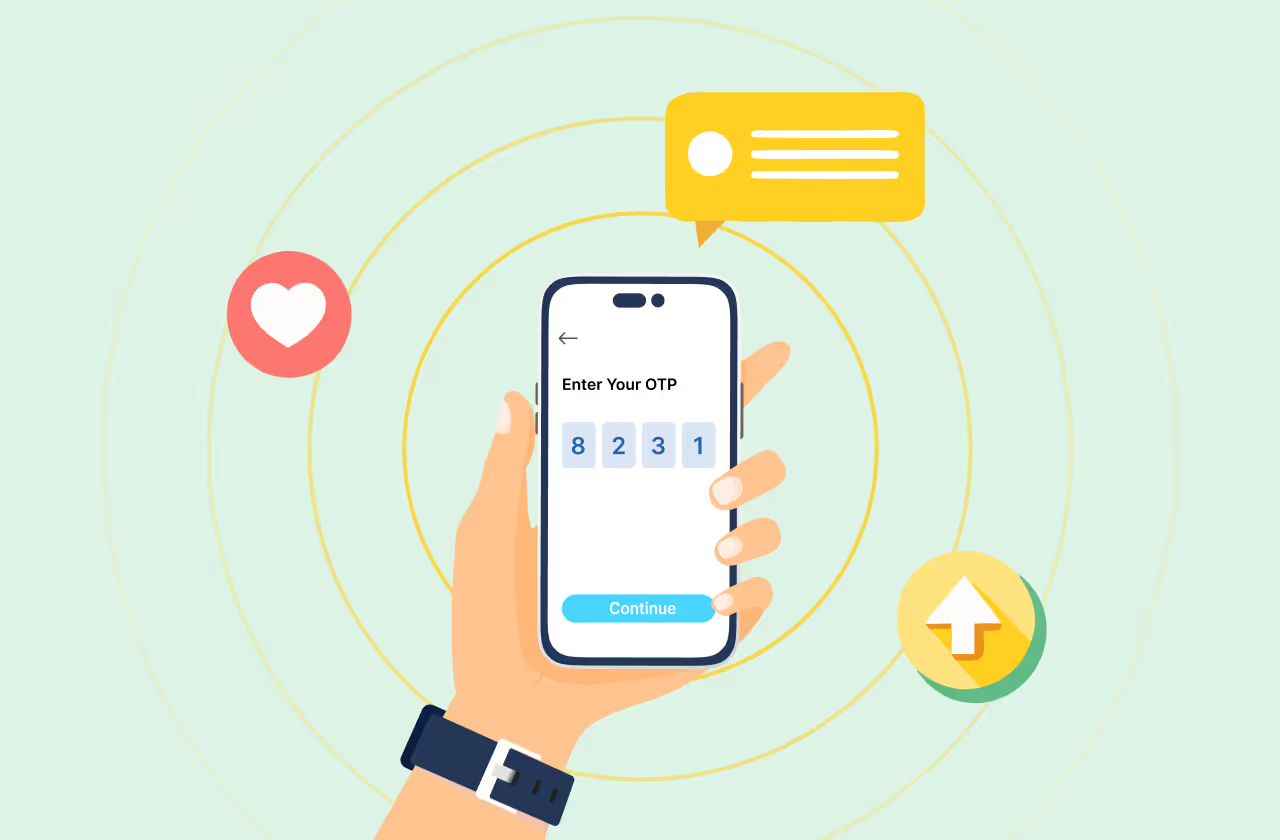Key Takeways
- Although WhatsApp OTP is cheaper, SMS OTP continues to rule the market because of its wide reach. This is also because
- OTP SMS has utility across industries including finance, healthcare, e-commerce, government and technology
- Securing online transactions by preventing fraud is one of the most popular use cases especially with finance and banking
- Healthcare industry use OTP SMS to protect patient records and comply with regulations
- Validating important documents is another use case for insurance and business administration
In the battleground of WhatsApp vs SMS, OTP is very crucial. According to Mobilesquared, WhatsApp OTP is cheaper, but OTP SMS has a better reach and facilitates ease of use. It is a verification tool that plays a crucial role in safeguarding sensitive information and preventing unauthorized access.
In this article, we will explore the use cases of OTP SMS in different industries and the benefits it brings to each sector while selecting the best OTP SMS provider.
Finance and Banking: Securing Online Transactions and Preventing Fraud
The finance and banking industry heavily relies on OTP verification to ensure the security of online banking transactions, money transfers, and account access. With the increasing prevalence of online fraud and identity theft, OTP SMS provides an additional layer of protection.
By sending a unique one-time password to the user's registered mobile number, financial institutions can verify the identity of the user and prevent unauthorized access to accounts. This authentication method not only enhances security but also instills confidence in customers, knowing that their financial information is well-protected.
Healthcare: Protecting Patient Records and Complying with Regulations
In the healthcare industry, the security and privacy of patient records are of utmost importance. OTP SMS authentication is widely used to secure access to electronic health records (EHRs) and comply with regulations such as the Health Insurance Portability and Accountability Act (HIPAA).
By implementing OTP SMS, healthcare organizations can ensure that only authorized personnel can access sensitive medical information. This helps prevent data breaches, safeguard patient privacy, and maintain the trust of patients.
E-commerce: Securing User Accounts and Transactions
With the boom of e-commerce, ensuring the security of user accounts and transactions is crucial to maintaining customer trust.
OTP SMS authentication is widely adopted by online retailers to secure user accounts and validate transactions, especially for high-value purchases.
By requiring customers to enter a one-time password sent to their mobile devices, e-commerce platforms can verify the identity of the user and protect against fraudulent activities. This not only safeguards customer data but also enhances the overall user experience by providing an extra layer of security during online transactions.
Government: Enhancing Data Protection and Preventing Unauthorized Access
Government agencies handle a vast amount of sensitive information, making it imperative to implement robust security measures. OTP SMS authentication is widely used by government entities to secure online portals and citizen services.
For example, it is employed in tax filing systems, voting systems, and access to government databases.
By utilizing OTP SMS, government agencies can enhance data protection and prevent unauthorized access to sensitive information. This authentication method ensures that only individuals with the correct one-time password can access government services, protecting citizen data and maintaining the integrity of government systems.
Even while using OTP SMS, organizations always follow guidelines for OTP SMS fraud prevention.
Technology and IT Services: Safeguarding Valuable Data and Intellectual Property
In the technology and IT services sector, protecting valuable data and intellectual property is paramount.
OTP SMS authentication is commonly implemented by technology companies and IT service providers to secure access to their platforms, databases, and cloud-based services. By requiring employees or users to provide a one-time password along with their regular credentials, such as usernames and passwords, organizations can ensure that only authorized individuals can access sensitive data and systems. This authentication method adds an extra layer of security, mitigating the risk of unauthorized access and data breaches.
Telecommunications: Securing Customer Accounts and Confidential Information
Telecommunication companies handle vast amounts of customer data, including call records, billing details, and account settings. OTP SMS authentication is widely utilized in this industry to secure customer accounts and protect sensitive information from unauthorized access. By implementing OTP SMS, telecommunication companies can verify the identity of customers and ensure that only authorized individuals can access their accounts. This helps prevent fraudulent activities and safeguards customer privacy.
Expanding Use Cases of OTP SMS Authentication

Apart from the industries mentioned above, OTP SMS authentication is being adopted in various other sectors to verify user identities and enhance security. Let's explore some additional use cases where OTP SMS authentication is proving to be highly effective:
Financial Services and Digital Banking: Safeguarding Funds and Sensitive Data
In the realm of financial services and digital banking, OTP SMS authentication plays a vital role in ensuring secure login and transaction verification. By sending a unique one-time password to users' mobile devices, financial institutions can safeguard customers' credit card information, funds, and sensitive data. This authentication method adds an extra layer of security, protecting against unauthorized access and fraudulent transactions.
Retail and E-commerce: Validating Customer Identities and Preventing Fraud
E-commerce platforms heavily rely on OTP SMS authentication to validate customer identities during payment processes and confirm transactions. By requiring customers to enter a one-time password sent to their registered mobile numbers, online retailers can reduce the risk of fraudulent transactions. This not only protects customer data but also enhances trust and confidence in the e-commerce platform.
Healthcare: Ensuring Secure Access to Patient Records
The medical industry leverages OTP SMS authentication to ensure secure access to patient records and confidential information. By requiring authorized individuals to enter a one-time password, healthcare organizations can prevent unauthorized access and protect sensitive medical data. This authentication method helps maintain patient privacy and compliance with regulations such as HIPAA.
Insurance and Employee Benefit Providers: Validating Claims and Access to Important Documents
Insurance companies and employee benefit providers utilize OTP SMS authentication to validate and verify claim submissions and control access to important documents. By implementing OTP SMS, insurers can enhance security and ensure that only authorized individuals can access sensitive information related to claims and other documents. This authentication method adds an extra layer of protection, mitigating the risk of fraudulent activities.
IT Services: Strengthening User Authentication
Information technology services can leverage OTP SMS authentication as an additional factor for user authentication. Alongside regular credentials like usernames and passwords, OTP SMS adds an extra layer of security when employees log in to systems, networks, or applications. This helps protect valuable data and intellectual property from unauthorized access.
Business Administration: Securing Confidential Documents and Approval Processes
OTP SMS authentication can be utilized to secure access to confidential documents and ensure the integrity of workflows that include approval processes. By requiring users to enter a one-time password, organizations can prevent unauthorized access to sensitive documents and maintain the confidentiality of important information.
Government Services: Protecting Personal Data and Preventing Unauthorized Access
OTP SMS authentication is widely used in government services to add an additional layer of security for individuals logging in to government portals or applications. Whether it's for tax filing, permit applications, or benefits enrollment, OTP SMS authentication helps protect personal data and prevent unauthorized access to government systems. This ensures the privacy and security of citizen information.
In conclusion, OTP SMS authentication is a powerful tool used across various industries to enhance security and provide a seamless user experience. Its applications range from securing online transactions in the finance and banking sector to protecting patient records in healthcare organizations. E-commerce platforms, government agencies, technology companies, telecommunication providers, and many others have recognized the importance of OTP SMS authentication in safeguarding sensitive information, preventing fraud, and maintaining trust with their customers.
Another benefit of the same is that you can get started in a matter of few minutes. With reliable providers like Message Central, you can even get started with OTP SMS without any DLT registration in India and without A2P 10DLC in the US.
As technology continues to advance, OTP SMS authentication will continue to evolve and adapt to meet the ever-growing security needs of different industries.









